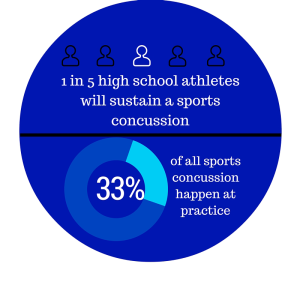
Concussions have affected sports players all around the world but believe it or not, many Cabrini sports players have had more than one.
Sarah Martinez, freshman on the women’s basketball team has had three concussions within a four-year span.
“After getting multiple ones you kinda start to realize like, maybe I should stop fooling around,” Martinez said.
While recovering from a concussion, doctors suggest not to be around bright lights.
Sometimes it can be hard to follow the doctor’s orders especially as a student who is used to being active.
“It’s like, that will power to just try to actually relax and like really listen to the doctor and not make it worse,” Martinez said.
Martinez says that she never wants to quit basketball and hopes that she does not reach the limit to where she will have to quit.
“Once you get six concussions, it’s like, you’re done. No more sports,” Martinez said.
Concussions can be very hard for a student-athlete especially when it affects play time and practice time during the season.
“It feels good that I overcame it but at the same time, I wish I never had it because there were so many times where I missed important games, but at the same time, that also motivated me to get better and do better,” Martinez said.
Concussions are often known to kill brain cells and cause short-term memory loss.
These are not the only damages head injuries cause. They can also link to things like alzheimer’s disease in the long run.
Maureen Sullivan, junior elementary and special education major, has had four concussions: three in high school and one in college.
“One concussion, I was out of school for a whole month and I was out of sports for an entire year,” Sullivan said.
Since concussions affect the brain, it is often hard to focus in school after having a one.
“I guess the hardest part was keeping up with my school work and trying to graduate on time in high school,” Sullivan said.
Sullivan has grown up on sports and played both basketball and lacrosse during high school. Her first concussion caused her to play less aggressively in the beginning, after her recovery.
“I played a lot more timid coming back, ‘cause once you get a concussion and get hit… it’s like… you’re prone to concussions basically,” Sullivan said.
Athletes have been playing sports for most of their lives and some say they could not imagine giving up the sport they love to a head injury.
“I’ve been playing sports every season for my entire life, so having to sit out for a whole year was probably the hardest year of my life… sports wise,” Sullivan said. “It wasn’t fun.”
Many athletes’ at the college who have had more than three concussions say that they would stop playing after the next one.
Matt Ward, senior communications major and men’s lacrosse player, says he had seven concussions that are documented.
“The first most recent one that I got was in eighth grade,” Ward said.
In the past concussions were not seen as a big problem and were taken lightly in sports.
“Back then, it was just, you got your bell rung, so like three plays later I was back in the game,” Ward said.
Although Ward has had many concussions, he is still able to play lacrosse after doing all the protocol.
“However many days I have symptoms I had to sit out, so I had nine days of symptoms and I sat out nine days and then they eased me back into the play,” Ward said.
“I bought one of those very good mouth pieces and it actually did help me,” Ward said. “[It helps with] Just keeping your jaw in line so when you get hit, it doesn’t let your head bounce.”
Many people believe that the only sign of a concussion is loss of consciousness but this is the case.
Ethan Trusty, sophomore business administration major, had his first concussion during his sophomore year of high school with no signs of unconsciousness.
“It’s not like I got hit hard. I just got a little nudge and then, you know, kind felt a little dizzy and was like ‘oh snap’,” Trusty said. “Later on found out that I had a concussion and it kinda put me out for a couple weeks.”
Sports players have to sit out of games and practices in order to heal and not cause further damage to their brains.
“When I got the concussion, I… you can’t do anything,” Trusty said.
“No physical activity, no nothing and as it was being my first concussion, I didn’t quite get that,” Trusty said. “So I would like play around and do everything and I’d wonder why I would be out for so long.”
When it comes to dealing with and recovering from concussions, it is important to follow the doctor’s rules.
“You just gotta let your brain heal,” Trusty said.


